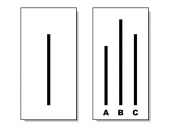In both natural and human sciences, knowledge claims' supporting material comes from a scientific method , involving experiments, observations, predictions, deductions, etc. When experiments and observations are carried out, quantitative data, that means numbers and statistics, is gained. Quantitative data can be analyzed using statistical methods, and results can be displayed using tables, charts, histograms and graphs. Therefore, it may show us clear and logical explanations of the phenomena, and the evidence for or against former assumptions. On the other hand, scientific method also involves constructing hypotheses (theoretical, hypothetical explanations of observations and measurements of the subject) and predictions (reasoning including logical deduction from the hypothesis or theory), which gives us only qualitative data. Qualitative data is generally an opinion and is kept as very subjective; however, it is sometimes possible to obtain approximate quantitative data from qualitative data: for instance, asking people to rate their perception of a sensation on a Likert scale (is a psychometric scale commonly used in questionnaires).
I think, the comparison of the validity between quantitative and qualitative data in the human and natural sciences might reveal that quantitative has more precision than qualitative.
There are three different ways in which in human sciences supporting data might be obtained. First method is called observation. There are lots possible biases in observational method: for example, if a person is observed with his consent, he might change his behavior due to that (according social identity theory) every person wants to show himself in a better way . When the national television filming group came into our class to do reportage, all of my classmates turned into artificially quiet and really interested into the lesson students, which, trust me, does not ever happen! However, if an observation occurs without a participant knowing about it, there is serious ethical...


